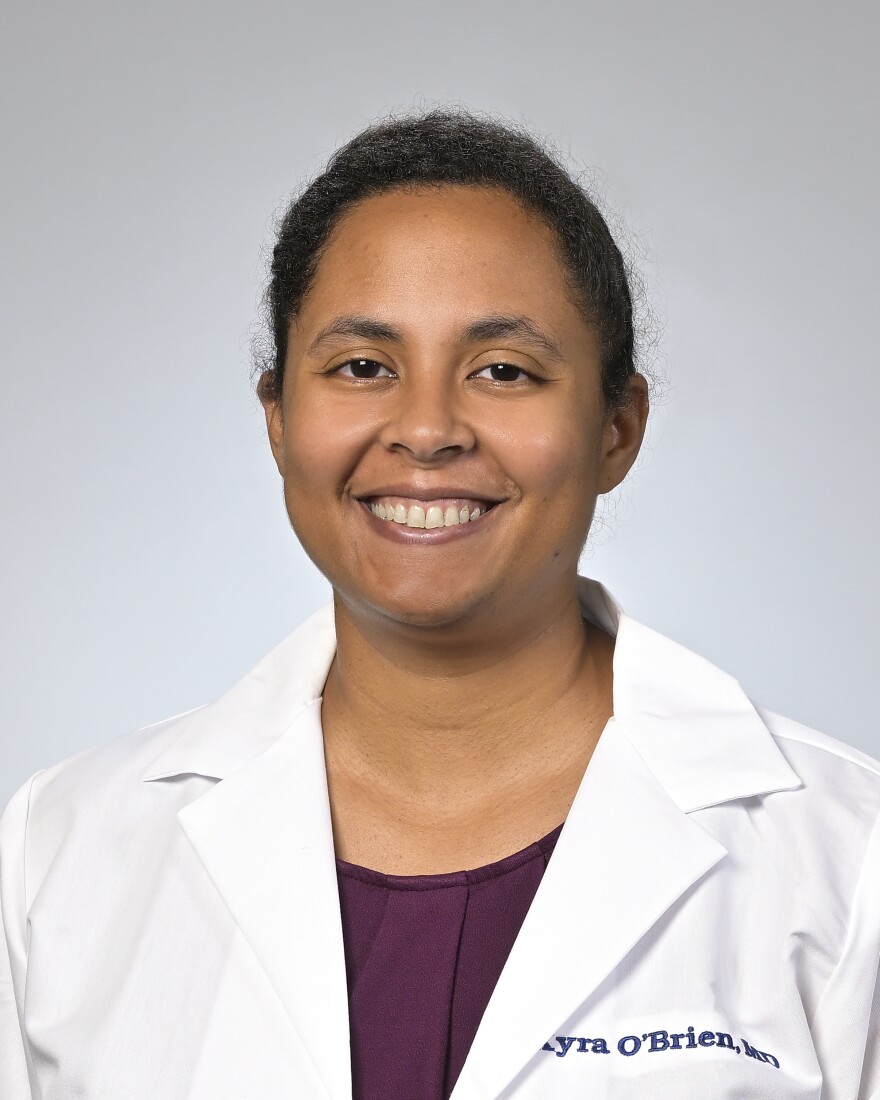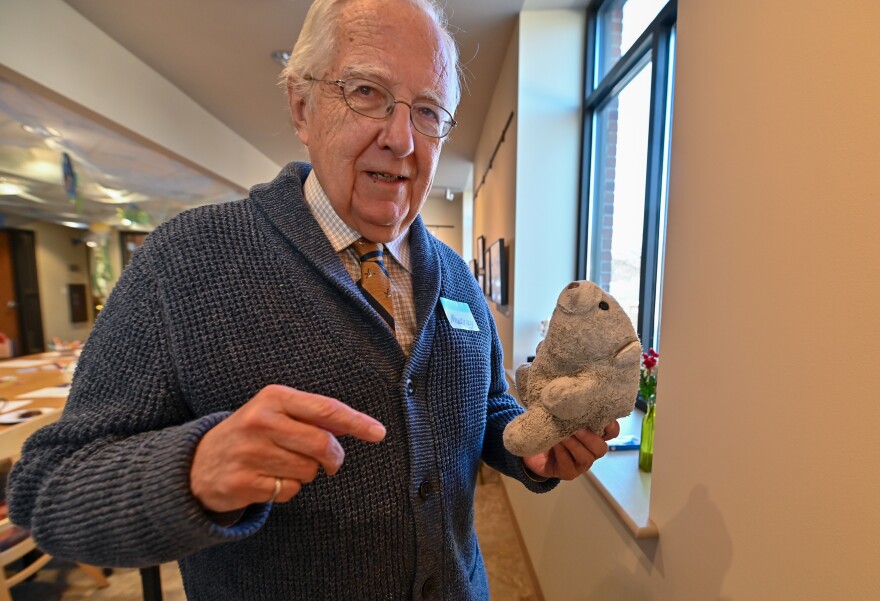People trickle in through the doors of Clarks Summit’s The Gathering Place and grab coffee and pastries before settling in for some coloring.
A quick round of trivia to get everyone’s minds working. Then, the group breaks off into activities like arts and crafts or playing the bells.
Rob Kennedy floats around the room, socializing with the new and usual members of the group. He laughs at himself as he makes a fish necklace out of clay, which he plans to give to his wife. He pipes up to answer trivia questions the rest of the group does not know.
The fun and familiarity are all a part of the Memory Cafe, a gathering for people experiencing memory loss. It helps people like Kennedy, who was diagnosed with early-onset Alzheimer’s Disease a little over a year ago.
When the diagnosis came, he felt like his world was crumbling.
Then, the 59-year-old Clarks Green resident found a community that helped him change his outlook on life.
“I have nothing to be ashamed of, nothing to be mad at,” Kennedy said. “It is what it is. There are a lot of people who are far more needy than I am. I'm still rolling around and enjoying life.”
However, that was not always the case. He retired from his job as a programmer at the University of Scranton, a job he held for decades before easy fixes began to stump him. His Alzheimer’s was discovered after he went to the doctor complaining about increased difficulty at work.
“What I used to be able to do in 10 minutes was taking me 10 days. Because there wasn't another person that did what I did, the pressure just kept building and building, and it just made it worse,” Kennedy said.
After a few months of worrying about the future, he found out about the Memory Cafe. The Gathering Place hosts the cafe twice a month. It’s open to those with memory loss and their loved ones, who often become caregivers.
'I had no choice but to accept [the diagnosis],' says Rob Kennedy. 'This gave me a purpose. I have something that I do. I can help so many other people. This is it. It is what it is. How do we deal with this and make it a little bit better? That's all we can do. We can't make it go away, but we can make it better.'
“It’s essential to know you’re a part of a community,” said Paula Baillie, treasurer of The Gathering Place’s board and program director for the Memory Cafe. “When life is getting a little tighter and closer to home, to know you're part of a community that you can engage with others when you want. The trivia is part of that. I think it energizes them. Now, does that translate into the weeks after? I don't know, but they keep coming back, and I think that's my evaluation of success there.”
Memory Cafes
The Gathering Place’s Memory Cafe opened in 2017. It closed for a few years during the coronavirus pandemic.
There are Memory Cafes across the state. According to AARP, Pennsylvania ranks seventh in the nation for most Memory Cafes. As of June 2022, the Commonwealth was home to 29 Memory Cafes.
The Clarks Summit cafe is funded by grants from local foundations and staffed entirely by volunteers.
“This is a labor of love. These ladies [the volunteers] who are here, they're giving up their time and the fact that they're giving up time, they recognize that this is important,” Baillie said.
While there were about 20 people present at the Jan. 24 Memory Cafe, Baillie said 15 people typically come.
She plans different themes and activities for each gathering. Jan. 24 was “under the sea” themed because of The Gathering Place’s transformation into Poseidon's Palace during that weekend's Clarks Summit Festival of Ice.
Trivia questions focused on sea animals and the oceans. Participants yelled out what they thought were the correct answers to questions like, “The most volcanoes are found in which ocean?” (answer: Pacific Ocean.)
During the crafting segment of the hour and a half long gathering, Baillie encouraged people to make fish necklaces out of clay.
Regardless of theme, each gathering follows a similar structure, including breakfast, coloring, trivia and breaking off into small groups for activities like crafting and playing the bells.

Baillie defines this Memory Cafe as a success. Even when turnout was low, she knew the Memory Cafe was addressing a community need.
“When we first started, we had just a couple come, and there were five volunteers, so they had a lot of attention,” she said. “At one point, people were saying, ‘Maybe you should close.’ I kept on saying, everything needs time, and we need to get this information out to doctors' offices, to community groups to let people know. I have a sense that there are many people who need this. Just before the pandemic, we had close to 20 people coming regularly. It truly is a success.”
The statistics
According to the Department of Aging, Pennsylvania has more than three million older adults, which ranks fifth highest among elderly populations in the country.
The Alzheimer’s Association, the world’s largest nonprofit funder of Alzheimer’s research, estimated the prevalence of Alzheimer’s in the Commonwealth to be 282,100 people, or 11.5%, of the 65 and up population.
The organization distinguishes between dementia and Alzheimer’s, saying Alzheimer’s is a degenerative brain disease and the most common form of dementia, while dementia is the blanket term for memory loss diseases.

Dr. Kyra O’Brien, a physician and assistant professor of neurology at Penn Medicine, said that age is a major factor in the likelihood of having a memory loss disease.
“Roughly a third of people over age 85 are living with some form of cognitive impairment,” O’Brien said.
While many older Americans and Pennsylvanians are impacted by memory loss, diseases like Alzheimer’s are not reserved for senior citizens, as demonstrated in Kennedy’s case.
“Early onset means it happens before the age of 65, so symptoms first appear before that age,” O’Brien explained. “Other than [that], symptoms are pretty similar. Otherwise, the age is the only distinguishing feature.”
9.6% of Pennsylvanians 45 and older display signs of subjective cognitive decline, according to the Alzheimer Association’s Pennsylvania report.
Avoiding social isolation, stimulating cognitive function
Jo-Ann Reif brings her husband Murray to every meeting she can. He has a memory loss diagnosis, and she serves as his primary caretaker. He brings a stuffed bear named Winston everywhere with him, and the Memory Cafe regulars know Winston as well as they know Murray.

“Murray likes to come here,” said Jo-Ann Reif. “He likes the social aspect. He likes to see the people. In fact, I've noticed that if we go someplace where there are a lot of people, he does better and he's more alert.”
That social interaction is important for people with memory loss and can even work in tandem with medicine to slow the progression of the disease.
O’Brien said she and colleagues at Penn Medicine observed how forced social isolation during the pandemic contributed to memory loss.
Now, they prescribe social events alongside medical prescriptions.
“We also learned a lot from the pandemic,” O’Brien said. “When people were forced to quarantine and become socially isolated, we saw a huge spike in the number of people reporting memory problems. [Socializing] both improves quality of life and also helps to prevent onset and slow progression of symptoms.”
According to America’s Health Rankings’ analysis of 2020 U.S. Census data, Pennsylvania ranks 37th out of the 50 states for the risk of social isolation for those 65 and older. The National Institutes of Health found that social isolation was associated with a 50% increased risk of being diagnosed with dementia.
The Penn Memory Center hosts a Memory Cafe, and O’Brien often urges her patients to visit it.
“A lot of times our patients are afraid to speak in social groups because they think people are going to notice their symptoms,” she said. “At a Memory Cafe, they're around people again who are experiencing the same thing, they feel more at ease just being themselves.”
Kennedy comes to the Memory Cafe by himself at his wife’s insistence.
“She chose to do that because she says I need a place that's mine,” he said.
He’s still able to drive and enjoys the independence of being able to go somewhere alone. He also appreciates the opportunity to give his wife space and socialize with others experiencing the disease.
“[My wife] also needs some time to gather herself together,” he said. “I don't want to say I'm a burden, but yes, I'm a burden. She's got so much to do when I'm at home to cater to different needs, and it's tough. I've come to grips with it. I have a booklet of things that my wife made for me that helps me through. It helps me through when I can't remember the name of the place, it's things that I need to know very quickly.”
Kennedy has been able to build a support system at the Memory Cafe.
“It made a difference for me because I came in and I was miserable. I come in now and it's like a big, extended family. It's really nice,” he said.
Caregivers finding community
The Memory Cafe benefits more than just people with memory loss.
According to the Alzheimer’s Association Alzheimer’s Disease facts and figures 2024 report, “Seven in 10 dementia caregivers (70%) report that coordinating care is stressful. More than half of caregivers (53%) said navigating health care is difficult. Two in 3 dementia caregivers (66%) also have difficulty finding resources and support for their needs.”
Baillie hears from caregivers how much the program helps them.
“When we first started, I thought I was doing it for the people with memory loss, and as soon as we started doing it, I realized, Oh, this is as much for them as it is for the caregivers,” she said. “Caregivers share with each other, their situations, their problems, their solutions, their ideas.”
Baillie, whose mother-in-law had Alzheimer’s and father had vascular dementia, knows how hard it can be on family members to watch their loved ones go through memory loss.
“Being able to turn to caregivers [with] some resources you can utilize is really important so that they don't feel alone,” she said. “This person who has the memory loss is experiencing their own thing, but the caregiver is watching the person they knew kind of disappear, and they're trying hard to hang on to them because this is a loving relationship to care for someone like this.”
O’Brien encourages caregivers to prioritize their socialization.
“Being a caregiver for someone with dementia takes up a lot of time, and one of the most common things we see is that our caregivers stop interacting with friends, family, in the way that they used to, because their entire existence is subsumed by taking care of their loved one,” she said. “That socialization really does help ease the stress that they feel from being a caregiver. We know that patients have better quality of life when their caregivers are under less stress.”
Joe Edwards defines himself as a caregiver to his wife Barb. The South Scranton resident started attending the Memory Cafe about a year ago, and he sees benefits for both himself as caregiver and his wife.
“As we age, if there are any memory issues, a lot of times, people will get alienated,” said Joe Edwards. “They feel lonely, especially in the winter, most people are staying home, and so they lose touch with their friends and neighbors. This is a nice place to come, where you can spend the day doing arts and crafts if you want, or puzzles, or you can just sit and chat, and that keeps us in touch.”
Advice for others
Baillie knows the Memory Cafe won’t be for everyone, but she wants interested people to come see if the cafe could offer support to families going through memory loss. She wants people to know that they are not alone.

Kennedy was able to turn his life around after a devastating diagnosis. He wants others to be able to do the same.
“I had no choice but to accept [the diagnosis],” he said. “This gave me a purpose. I have something that I do. I can help so many other people. This is it. It is what it is. How do we deal with this and make it a little bit better? That's all we can do. We can't make it go away, but we can make it better.”
For him, laughter has proven to be one of the best medicines.
“If [people in similar situations are] not coming to a place like this, and lots of areas have a place like this, they're doing themselves a disservice,” Kennedy said. “You're becoming your own obstacle. You got to get out there and see people that are laughing.”
The next Memory Cafe will take place on Friday, Feb. 14 at 10 a.m. at The Gathering Place. To people thinking about joining the group, Baillie said, “Just come!”









